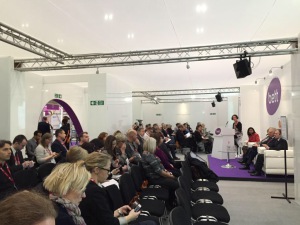David Walker (Head of Technology Enhanced Learning, University of Sussex) reflects on Bett 2015.
I recently had the honour of participating in a panel session at Bett, one of the world’s largest educational technology events and trade shows, as part of the exhibition’s Technology in Higher Education Summit.
I spoke alongside a distinguished panel of speakers including Dr Jaya Kannan (Director of Digital Learning, Sacred Heart University), Professor Gavin Brooks (Pro Vice-Chancellor Teaching and Learning, University of Reading) and Professor Margaret Cox OBE (Professor of Information Technology in Education, Kings College London).
The theme of the Summit was Developing Pedagogywhile the topic of the panel session was ‘Behaviour change: Creating a community to encourage educators to adopt technology and change their pedagogy’. Panellists were invited to share initial observations in response to the topic before broadening the discussion by opening up to questions from the floor.
A lively conversation ensued with many overlapping points made. In my opening gambit I proposed that – contrary to popular rhetoric – change in higher education is often an organic process, rather than a transformational one. Linked to this I suggested that as individuals and institutions we need to give careful thought to the language we use in relation to change as this can itself become a source of resistance, potentially delaying or threatening the success of the proposed change. While the result of a particular change initiative might be transformational (be that the successful implementation of some new educational technology or an alternative teaching approach), the change process itself tends to be progressive, developmental. The language we use should reflect this.
Communication is the cornerstone of change.
Transformation brings with it the notion of a marked change, and for some individuals it might be difficult to reconcile that their existing practice would benefit from, or indeed is in need of change of such magnitude. Change in this context might therefore be perceived as a threat to be challenged and even resisted. Communication is the cornerstone of change. The language we use and our approach to articulating our vision for change can be a key enabler or a major barrier and may therefore demand a more sympathetic approach.
Vision also figured in responses to two questions posed to the panel querying whether technology enhanced learning was perpendicular to good learning and teaching, and how we communicate to staff the benefits of engaging with learning technology. Professor Brooks asserted that it is an institutions vision for TEL (clearly stated and evidenced by investment and resourcing) that defines the relationship of technology use in teaching and that the two can be synergistic rather than conflicting. On engagement with technology I similarly argued that our role as learning technology professionals is to help establish a rich and rewarding environment within which staff teach and within which effective learning can take place. Enhancement is at the heart of this ethos and one to which I believe we have a collective responsibility.
Bett 2015 was a tremendously energising experience and I’m certain the near 40,000 educators who attended over the course of the four days are already looking forward to Bett 2016 which will run from the 27th-30th of January.
You can listen to a podcast recorded by Jisc at the Bett Technology in Higher Education Summit.
You can also read a summary from PC Pro of the ‘Ten lessons learnt from Bett 2015’.
Tweets from the event can be accessed using the hashtag #bett2015
Follow David Walker on Twitter @drdjwalker






[…] Read the full story by University of Sussex Technology Enhanced Learning Blog […]